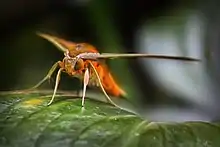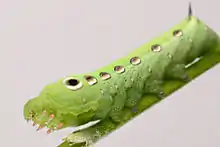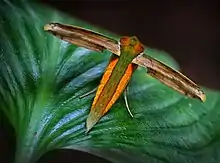| Tersa sphinx | |
|---|---|
 | |
 | |
| Scientific classification | |
| Domain: | Eukaryota |
| Kingdom: | Animalia |
| Phylum: | Arthropoda |
| Class: | Insecta |
| Order: | Lepidoptera |
| Family: | Sphingidae |
| Genus: | Xylophanes |
| Species: | X. tersa |
| Binomial name | |
| Xylophanes tersa | |
| Synonyms | |
| |
Xylophanes tersa, the tersa sphinx, is a moth of the family Sphingidae. The species was first described by Carl Linnaeus in 1771. It is found from the United States (Massachusetts south to southern Florida, west to Nebraska, New Mexico and southern Arizona), through Mexico, the West Indies and Central America and into parts of South America (including Bolivia, Paraguay, Argentina and Brazil). An occasional stray can be found as far north as Canada.
The wingspan is 60–80 mm. The upperside of the forewing is pale brown with lavender gray at the base and has dark brown lines. The upperside of the hindwing is dark brown with a band of whitish, wedge-shaped marks. Adults are on wing from May to October in the north and February to November farther south in the US, and they fly year round in the tropics. There is one generation in the north and several generations farther south, in Florida and Louisiana, for example. The adults feed on the nectar of various flowers, including Lonicera, Mirabilis jalapa and Asystasia gangetica.
The larvae feed on Borreria, Catalpa, Manettia, and Pentas species, and Spermacoce glabra, Hamelia patens, Hedyotis nigricans, Heimia salicifolia, Psychotria microdon, Psychotria nervosa, and Inga vera.
Subspecies
- Xylophanes tersa chaconi De Marmels, Clavijo & Chacín, 1996 (Venezuela)
- Xylophanes tersa tersa

References
- ↑ "CATE Creating a Taxonomic eScience - Sphingidae". Cate-sphingidae.org. Archived from the original on 2012-11-05. Retrieved 2011-10-25.
External links
- Xylophanes tersa tersa. Sphingidae of the Americas.
- Lotts, Kelly & Naberhaus, Thomas (2017). "Tersa Sphinx Xylophanes tersa (Linnaeus, 1771)". Butterflies and Moths of North America. Retrieved November 26, 2018.